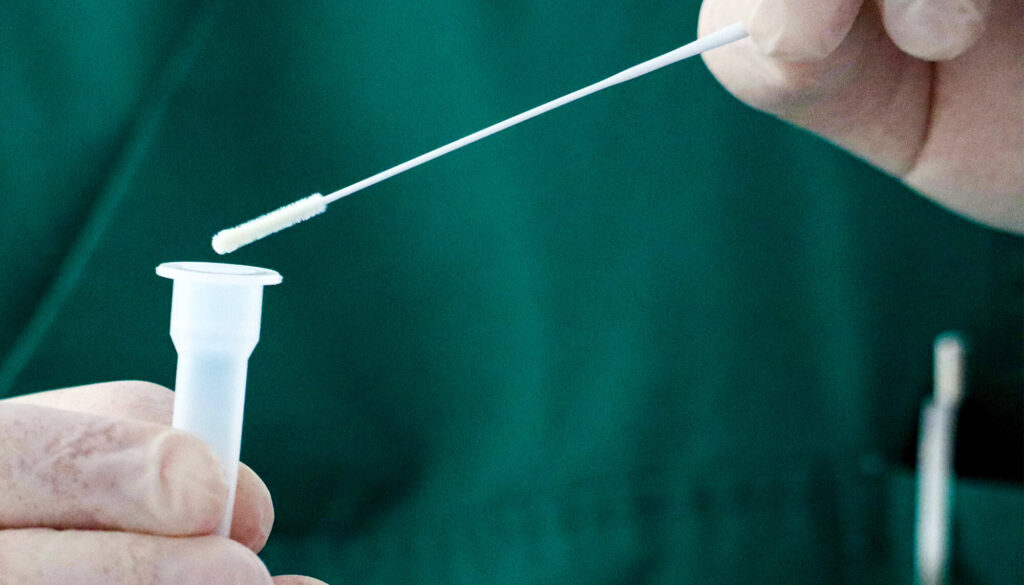COVID-19 Testing for Travellers
International travel during the COVID-19 pandemic can be difficult to navigate. Every country has their own set of COVID-19 entry requirements, and these requirements are frequently changing. Many countries require proof of a negative COVID-19 test within a certain timeframe before entering the country, but there are different types of COVID-19 tests. Some countries accept COVID-19 antigen tests while other countries require a molecular test such as a PCR/NAAT (Nucleic Acid Amplification Test). Below you’ll find the different types of COVID-19 tests explained and some frequently asked questions about COVID-19 testing for travel.
Antigen Testing
The COVID-19 antigen test detects the presence of specific viral proteins called antigens. Antigen tests for asymptomatic travellers are used to screen for a current COVID-19 infection. A sample is collected from inside the nostrils and can be analyzed at the time and place of sample collection (referred to as point of care tests). Advantages of point of care antigen tests include lower cost than PCR tests and a shorter turnaround time for test results, usually between 15 to 30 minutes.
Disadvantages of the antigen test is that it is less accurate than the PCR/NAAT test. There is a higher chance the test could miss a COVID-19 infection resulting in a false negative result, especially in people who are asymptomatic. A false negative result means that a person may be infected with COVID-19 but could test negative using the antigen test. The antigen test is more accurate when it is used on a person who is experiencing symptoms of COVID-19.
PCR Testing
The PCR test is the “gold standard” for COVID-19 testing. The highly accurate PCR test uses polymerase chain reaction to detect viral RNA to diagnose or screen for a current or recent COVID-19 infection. The sample can be collected from: inside the nostrils (bilateral nasal swab), deeper in the nasal passage (nasopharyngeal), or from the saliva using the gargle and swish test. Samples are sent to an accredited laboratory in the Lower Mainland for analysis. While the PCR test is more expensive than the antigen test and has a longer turnaround time for results, the PCR test is more accurate than the antigen test.
Antibody Testing
The COVID-19 antibody test (also known as a blood serology test) is used to detect antibodies in your blood. Antibodies are made by the immune system to fight infections in response to the virus after you have been infected or vaccinated. Antibodies can take several days or weeks to develop after an infection and may stay in your blood for several weeks or more after recovery. Hence, they are used to detect a past infection and are not recommended for diagnosing an active COVID-19 infection.
We do not yet know how long antibodies last in someone who has previously been infected or who has been vaccinated against COVID-19. Researchers also do not yet know whether the presence of antibodies means that you are immune to reinfection of COVID-19 in the future.
The COVID-19 antibody test currently available at LifeLabs (where the blood sample is analyzed) can only be used to detect antibodies after infection with COVID-19 and cannot be used to detect antibodies after vaccination. The test detects antibodies made in response to the nucleocapsid (N) protein of the virus, while the vaccine produces antibodies in response to the spike (S) protein of the virus.
TravelSafe clinic can provide a requisition for an antibody blood test for individuals requiring the test for travel purposes only. Some countries, including China, may require both a PCR and antibody test prior to travel.
COVID-19 Vaccine Status
Many countries require proof of a negative COVID-19 test despite a traveller being fully vaccinated against COVID-19. Prior receipt of any COVID-19 vaccine will not affect the results of the antigen, PCR, or antibody tests.
Which Type of Test Should I Book?
Travellers must determine the COVID-19 entry requirements of their destination country to know what type of test is needed and when to book it.
There are several ways to determine the COVID-19 testing requirements of your destination country:
- The airline you are travelling with may be able to provide testing requirements of your destination country.
- TheInternational Air Transport Association (IATA)is the trade association for the world’s airlines, representing some 290 airlines or 82% of total air traffic. The website includes an interactive COVID-19 travel regulations map of the world that outlines travel restrictions and entry requirements related to COVID-19.
- Air Canada’s Travel Ready Hub provides COVID-19 travel requirements of international destinations.
- The Global Affairs Canada website can be used to locate Foreign Government Offices in Canada for your destination country. Contact your destination’s embassy or consulate in Canada to find out if you need a visa to enter the country, or to determine current COVID-19 entry requirements.
- The Government of Canada website provides information about who can enter Canada, requirements for entering Canada including accepted COVID-19 tests and quarantine requirements, as well as exemptions for testing and quarantine. A checklist is available to ensure you meet all requirements before arriving at the border.
Travellers Who had COVID-19 and Recovered
Many countries, including Canada, will accept proof of a previous positive COVID-19 test within a specific timeframe before entering the country. Some countries also require a physician’s clearance letter to verify that the individual is fit to travel.
If you tested positive for COVID-19 using a take-home antigen test kit then you will likely need the result of a positive PCR test for travel as a requirement for returning to Canada. TravelSafe Clinic can provide PCR testing for these individuals, as long as it has been at least 5 days since the positive antigen test for fully vaccinated travellers (10 days for unvaccinated or partially vaccinated travellers), and symptoms of COVID-19 have resolved or improved. TravelSafe Clinic can also provide a physician’s clearance letter if this is a requirement of your destination country.
COVID-19 Testing at TravelSafe
TravelSafe Clinic offers:
- The PCR-based NAAT test: samples are collected from clients and are tested in an accredited laboratory in the Lower Mainland. The lab result and health care certificate, signed by a health care professional, will be emailed to you as soon as the result is available, usually in 1-2 days.
- The Abbott PanBio Antigen test: samples are collected from clients and are tested in the clinic. The result is available within 15-30 minutes and will be sent by email as soon as it is available.
- The COVID-19 antibody test: a lab requisition is provided to clients requiring an antibody test for travel purposes only. The requisition is taken by the client to a LifeLabs collection centre to have a sample of blood taken and analyzed. The result is usually available within 24 hours and will be sent by email as soon as it is available.
Express PCR testing: TravelSafe offers same day PCR test results for last minute departures Monday to Friday.
Mobile Concierge Service: This VIP service is a convenient and safe way for the busy traveller to complete COVID-19 testing. A registered nurse will come to your location and collect samples from asymptomatic individuals and small groups.
If you require a COVID-19 test for travel, work, or occupational purposes, please call 604-251-1975 or email us at info@travelsafeclinic.ca to arrange an appointment.



